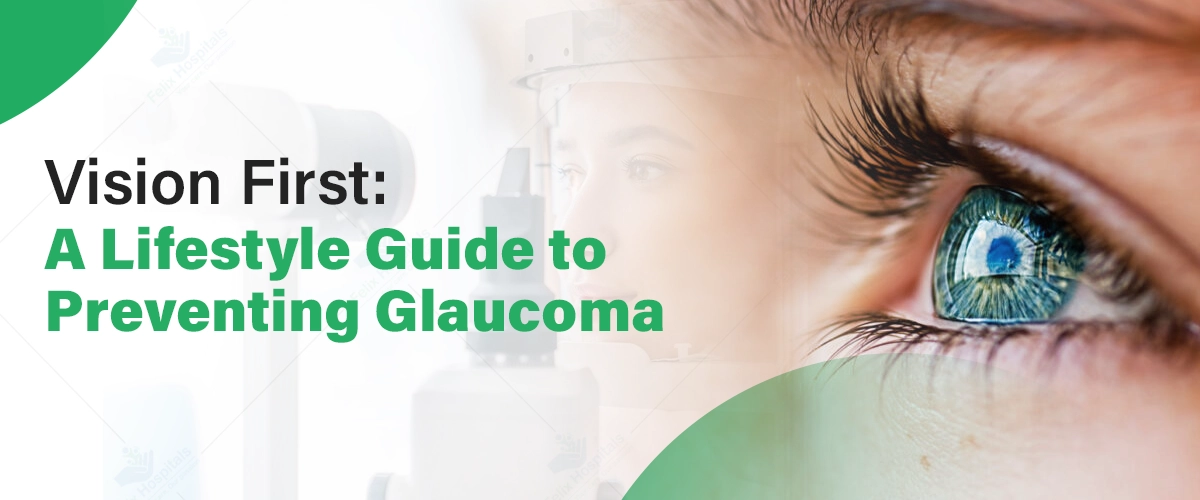
Subscribe to our

Glaucoma is a group of eye conditions that cause damage to the optic nerve, which is essential for vision. It is one of the leading causes of blindness worldwide. While the symptoms of glaucoma can be subtle and go unnoticed until significant damage has been done, early prevention and management can make a huge difference in maintaining good vision. The best hospital for glaucoma surgery will provide not only treatment but also guidance on lifestyle choices that help prevent this debilitating condition.
In this blog, we will explore how various lifestyle choices play a role in reducing the risk of glaucoma and its symptoms. Through proper care, regular check-ups, and informed decisions, you can protect your eyesight and prevent the onset of glaucoma.
Remember, vision is precious—take the steps today for a clearer tomorrow! Call us Now at +91 9667064100.
Glaucoma is a condition where the optic nerve, which transmits visual information to the brain, gets damaged, often due to high intraocular pressure. Over time, this can lead to a gradual loss of vision. There are several types of glaucoma, the most common being:
The symptoms of glaucoma are often not noticeable in the early stages. However, as the condition progresses, symptoms may include:
Recognizing glaucoma symptoms early and seeking medical intervention is crucial to prevent severe damage.
Lifestyle choices directly influence eye health. A balanced lifestyle, including a healthy diet, regular exercise, and stress management, can contribute to lower the risk of developing glaucoma. By maintaining overall health, you can support the health of your eyes and reduce the chance of experiencing the symptoms of glaucoma.
Certain foods can contribute to the health of your eyes and may help prevent glaucoma:
Regular physical activity can help maintain eye health by improving circulation and reducing intraocular pressure. Exercise like yoga, swimming, and aerobics is especially beneficial. Maintaining a healthy weight and reducing stress also have positive effects on eye health and overall well-being.
Taking care of your eyes and protecting them from environmental harm is essential in glaucoma prevention:
Chronic stress can affect your overall health, including eye health, and contribute to increased intraocular pressure. Practices such as meditation, deep breathing, and yoga can reduce stress levels and help maintain eye pressure within healthy limits.
Poor sleep habits have been linked to an increased risk of glaucoma. During sleep, the body regulates intraocular pressure, so maintaining a healthy sleep schedule is critical. Ensure you get 7-8 hours of quality sleep each night to support eye health.
Certain habits and medical conditions increase the risk of glaucoma:
Regular eye exams are the best way to detect glaucoma early. Those who should consider getting screened include:
Individuals over 40, especially those with a family history of glaucoma.
People with high intraocular pressure or those on medications that may increase eye pressure.
The frequency of eye exams depends on your risk factors, so consult your healthcare provider for a personalized schedule.
If you are looking for expert care for glaucoma, Felix Hospitals is home to some of the best ophthalmologists in Noida:
Experiencing glaucoma? Don't worry—Felix Hospital is here to help. Click here for more information and get the expert care you need.
Glaucoma is a serious condition that can lead to irreversible vision loss if not managed properly. However, by adopting a healthy lifestyle, maintaining regular eye exams, and managing risk factors, you can reduce your risk and maintain your vision.
The glaucoma surgery cost may vary depending on various factors, but early detection can prevent the need for advanced treatments later on.
Q1- How can I prevent glaucoma with a family history?
ANS: Regular eye exams, managing health conditions like hypertension, and maintaining a healthy lifestyle with proper diet, exercise, and stress management can reduce the risk. Early detection is key.
Q2- What’s the connection between intraocular pressure (IOP) and glaucoma?
ANS: High IOP can damage the optic nerve and lead to vision loss. Regular eye exams, hydration, and exercise help regulate pressure and reduce risks.
Q3- Can exercise help manage glaucoma?
ANS: Yes! Activities like yoga, swimming, and aerobics help lower IOP, improve circulation, and reduce stress, benefiting eye health.
Q4- What dietary changes can reduce glaucoma risk?
ANS: Eating antioxidant-rich foods, such as leafy greens, citrus fruits, and fatty fish, along with staying hydrated, supports eye health and maintains IOP.
Q5- How does sleep affect glaucoma risk?
ANS: Poor sleep raises IOP, increasing glaucoma risk. A regular 7-8 hour sleep schedule helps regulate eye pressure.
Q5- Is smoking linked to glaucoma?
ANS: Yes, smoking reduces blood flow to the eyes and increases IOP. Quitting smoking reduces glaucoma risk.
Q6- What are the latest advancements in glaucoma treatment?
ANS: Minimally invasive surgeries like MIGS and new treatments focus on managing IOP. Discuss all options with your ophthalmologist.